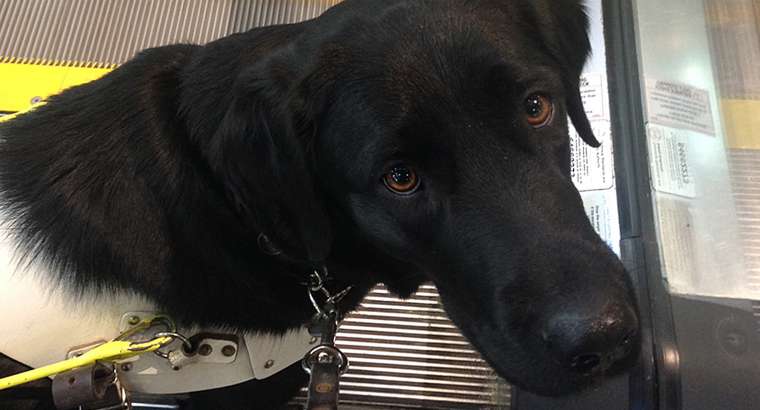Okanagan Resident goes Anywhere, Thanks to Guide Dog
From Kelowna Daily Courier September 2014
Carolyn Marie leads a more independent life because of Nimbus, her guide dog.
Born in Toronto, Carolyn Marie moved to Kelowna, in 1987. Marie was a single mother and always tried to be a positive influence to her three children.
She believes in looking at the bright side of everything, always seeking out the positive. This wasn’t easy during the time when she started losing her vision.
Marie lost her sight due to barn swallow droppings. Barn swallows carry diseases, including histoplasmosis, spread by contact with swallow poop, nest materials and dead swallows.
Histoplasmosis is a fungus disease contracted through airborne spores in swallow droppings. If swallows have been on your roof for a while, these spores can even infect the soil your garden in down below. Its symptoms may be anything from a mild influenza to blood abnormalities and fever, or even death.
An eye condition has been linked to histoplasmosis and it can lead to blindness in those who contract it, as was the case with Marie. Legally blind since 1990, she first lost vision in her left eye, and it happened quickly.
“In about 20 minutes,” said Marie.
It wasn’t until five and a half years later she lost sight in her right eye.
“The most interesting thing going blind was the behaviour and reaction of my kids,” she said. “My son had just received his driver’s licence. He had to start driving me places. “My 11-year-old daughter had to start writing cheques for me.”
There was a time when Marie recalls her son having to drive her from Kelowna to Vancouver, more than a four-hour drive away, to see a specialist. Although he denied it, she remembers teasing her son, calling him a “wimp” for crying while in the waiting room with her. Again, she told him to focus on the positive and find the humour in things. His reaction was surprise, asking her, “What’s so funny about going blind?”
After several minutes of silence, Marie says her son jumped off the chair and exclaimed a loud “Yes,” followed by “If you’re blind, I got a car!”
“For 16 years I’ve been told ‘you can’t do that.’ Now I have the perfect match,” added Marie referring to her guide dog, a black Labrador retriever named Nimbus.
After doing some research on the subject, Marie finally made the decision to apply for a guide dog in 2011 so she could be more independent. She was paid a visit by a Guide Dog Mobility Instructor to determine her mobility requirements, and contacted very soon after to be notified she was accepted and a suitable dog would be matched with her.
That dog is Nimbus.
“Nimbus is very patient. When you lose your sight, you need patience. You do a lot of sitting and waiting, relying on other people. Nimbus is very cuddly, like me, and she loves to work.” Marie and Nimbus share another common bond. The dog was raised by a volunteer puppy walker that was an occupational therapist, spending much time in that kind of environment.
Marie was an occupational therapist assistant, a long-term care aid for geriatrics, before her vision loss forced her to stop working. Marie was already a positive and active person. Having Nimbus has only enhanced that. She is familiar with bus routes in Kelowna and gets around fine, but now has added confidence by having a guide dog.
“I don’t get involved in things where I rely on other people to pick me up. Sometimes they are late or don’t show up. Now, I can do more on my own with Nimbus.
“I volunteer more, and get to church on my own. I can go everywhere. I didn’t go for a walk at night for 16 years and I can do that now.” There is a lot to learn when training with a guide dog, but Marie, again with her sense of humour, says, “Canadian Guide Dogs for the Blind is the spa and resort I’ve never been to”.
Again, it’s her positive perspective on being away from home for several weeks residing at the organization’s National Training Centre in Ottawa.
“I woke up at 5:30 a.m. to feed and groom Nimbus, have breakfast, and get myself ready to take on the day. You are kept busy all day when you are training. It’s a lot of hard work, but definitely worth it.”
Canadian Guide Dogs for the Blind is a registered charity, established in 1984. Since that time, the organization has trained and provided guide dogs to more than 750 visually impaired Canadians. To learn more about Canadian Guide Dogs for the Blind visit guidedogs.ca.


